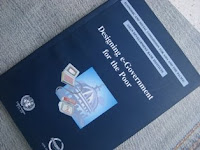DESIGNING E-GOVERMENT FOR THE POOR, ADB INSTITUTE

Judul/Title: Designing e-Government for the Poor
Penulis/Author: ADB InstitutePenerbit/Publisher: UN ESCAP
Edisi/Edition: 2005
Halaman/Pages: 184
Dimensi/Dimension: 17 x 24.5 x 1.2 cm
Sampul/Cover: Paperback
Bahasa/Language: English
Kategori/Category: Sewa/Rent
Harga Jual/Sale Price: Tidak Dijual/Not for Sale
Call No.: 378.1/Sid/k/C.1
Status: Ada/Available
***
In recent years, the countries of the Asian and Pasific region have increasingly adopted e-government. E-government can be defined as the transformation of public-sector internal and external relationships through use of information and communication technology (ICT). E-government for the poor means that an e-government strategy and related policies must be aimed at bridging the digital divide, the uneven distribution and use of ICT between the poor and the rich. E-government is a tool to achieve better governance and enhance economic development.
Many nations have developed an e-government strategy, and are rapidly expanding the use and knowledge of ICT by establishing online public services and digital collaboration between government ministries. However, successful implementation of e-government remains a challenge. It requires a fundamental transformation of traditional government organization, rebuilding of the infrastructure; and tremendous financial and human resources. Sustainability of e-government programmes requires policies, legislation, and a legal framework conducive to reorganizing the government and its services to the citizens.
Kategori/Category: Sewa/Rent
Harga Jual/Sale Price: Tidak Dijual/Not for Sale
Call No.: 378.1/Sid/k/C.1
Status: Ada/Available
***
In recent years, the countries of the Asian and Pasific region have increasingly adopted e-government. E-government can be defined as the transformation of public-sector internal and external relationships through use of information and communication technology (ICT). E-government for the poor means that an e-government strategy and related policies must be aimed at bridging the digital divide, the uneven distribution and use of ICT between the poor and the rich. E-government is a tool to achieve better governance and enhance economic development.
Many nations have developed an e-government strategy, and are rapidly expanding the use and knowledge of ICT by establishing online public services and digital collaboration between government ministries. However, successful implementation of e-government remains a challenge. It requires a fundamental transformation of traditional government organization, rebuilding of the infrastructure; and tremendous financial and human resources. Sustainability of e-government programmes requires policies, legislation, and a legal framework conducive to reorganizing the government and its services to the citizens.


Komentar
Posting Komentar